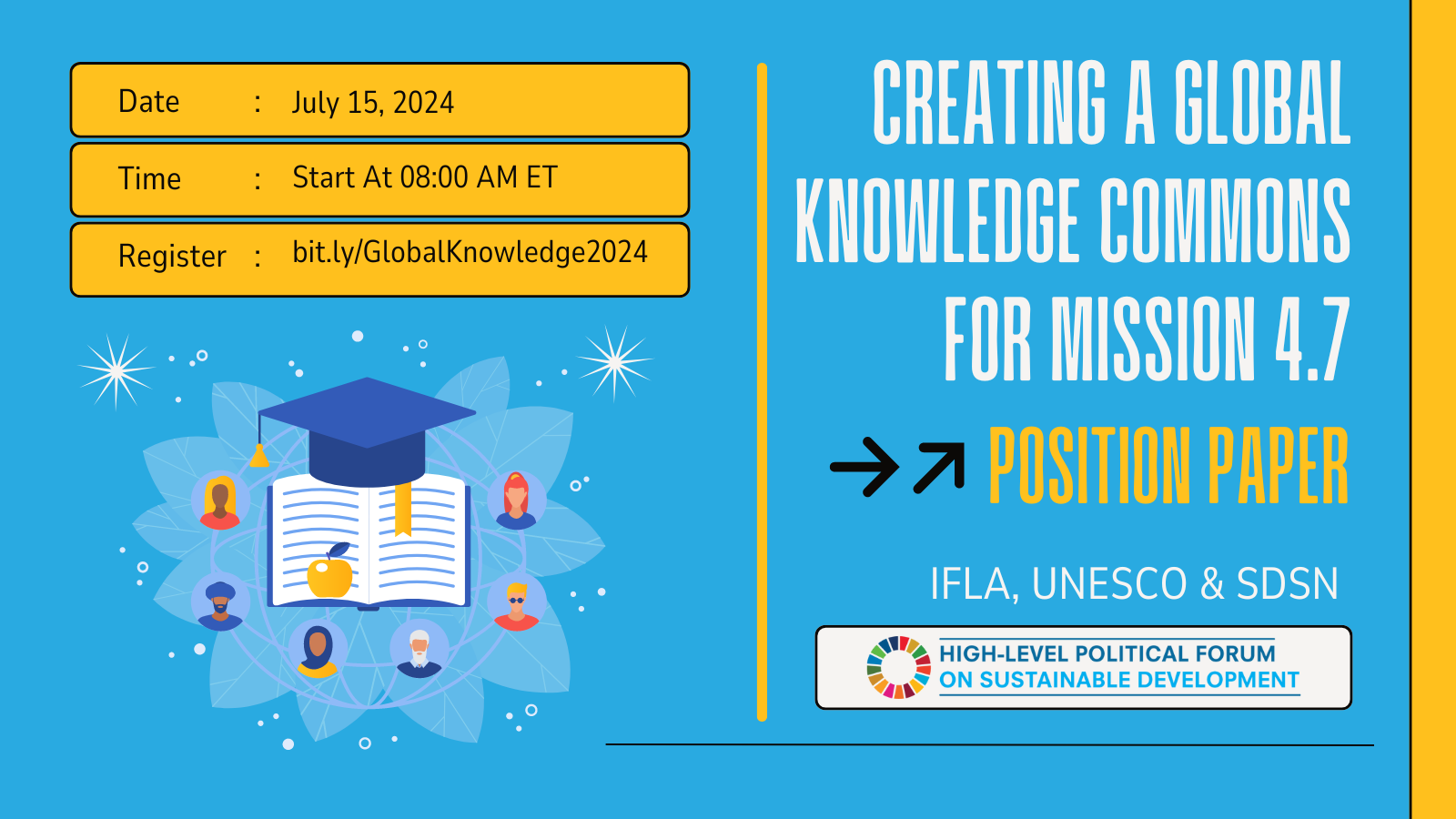Read the Report:
Introduction
The HLPF virtual event, Creating a Global Knowledge Commons for Mission 4.7, hosted by the International Federation of Library Associations and Institutions (IFLA), UNESCO, and SDSN, served as an official launch of the SDSN research report commissioned by IFLA: “Towards a Global Knowledge Commons for Sustainable Development.” The report focuses on the importance of partnerships with libraries to create open science, data, education resources for use in education and training for sustainable development. The virtual event explored the potential of libraries as assets for sustainable development with a focus on the role of open license educational resources (OER) and the United Nations Digital Library.The speakers highlighted equitable access to knowledge and the need for strategic leadership, digital transformation, and user experience in libraries. The conversation ended with discussions on the challenges of disseminating content, the potential of digital libraries and repositories, and the release of the report aimed at facilitating global partnerships. The takeaways from the event fell into three categories: Libraries, sustainable development, and OERs; UN and university library strategies; and equity and accessibility of OER.
Speakers:
- Niamh Brennan, Programme Manager for Research Informatics, Trinity Innovation and Enterprise, Trinity College Dublin
- Sharon Memis, Secretary General and CEO, IFLA
- Zeynep Varoglu, Programme Specialist, UNESCO
- Meg Wacha, Scholarly Communications Officer Coordinator, Outreach & Community Engagement Unit Dag Hammarskjöld Library
- Daisy Selematsela, University Librarian at the University of the Witwatersrand (Wits University)
- Masud Khokhar, University of Leeds, Knowledge Equity Network
- Ramune Petuchovaite, EIFL Public Library Innovation Programme (EIFL-PLIP) Manager for Electronic Information for Libraries (EIFL)
- Patrick Paul Walsh, Vice President of Education, UN Sustainable Development Solutions Network (SDSN)
Libraries, Sustainable Development, and OERs
Niamh Brennan, Programme Manager for Research Informatics, Trinity Innovation and Enterprise, at Trinity College Dublin, served as the moderator for the event. Brennan first introduced Sharon Memis, the former Chief Operating Officer at the Association of Commonwealth Universities and the current Secretary General and CEO at IFLA, who discussed the underutilized potential of libraries as assets for sustainable development. She highlighted the work of SDSN in collaboration with IFLA, emphasizing the role of libraries in education and their contribution to the Sustainable Development Goals (SDGs). Libraries serve as content curators and distributors. By housing content related to the SDGs, libraries can and should make educational resources available for free and via different mediums to be distributed and accessed globally.
Zeynep Varoglu, Programme Specialist at UNESCO, then took the floor to share initiatives that had been discussed with SDSN and IFLA, focusing on the importance of open educational resources (OER) for sustainable development. The OER project between SDSN, UNESCO, and IFLA aims to create a digital repository of SDG related content that can be openly accessed by teachers, professors, students, and the general public. This OER platform has been approved by UNESCO and is currently in development.
United Nations Digital Library and University Library Strategies
Next, Brennan introduced Meg Wacha, Scholarly Communications Officer Coordinator for the Outreach & Community Engagement Unit at the UN Dag Hammarskjöld Library, who shared their recent experience and upcoming event in Dubai. Wacha discussed the United Nations Digital Library and its role in facilitating open science and scholarship, emphasizing the need for equitable access to science for all. The UN Digital Library makes available UN publications such as research studies, policy briefs, and official documents not only to UN delegations and government officials, but also to instructors and learners. The library also convenes the bi-annual Open Science Conference which brings together researchers, policy makers, international organizations, members of civil society, and others, to discuss the opportunities and challenges of practicing open science. This conference encourages the further development of OER and expands the availability of global resources. Wacha highlighted that the UN Digital Library should be used to teach more people about the SDGs.
Similarly, Daisy Selematsela, University Librarian at the University of the Witwatersrand (Wits University), shared her institution’s investment strategy focusing on the SDGs and highlighted the library’s role in advancing these goals through information literacy instruction, partnerships, and training. She also discussed the library’s collaboration with the Department of Marketing and Corporate Communications to raise awareness about the library’s resources and its focus on social justice and cohesion. It is essential for universities and other institutions to invest in OER and to spread the reach of the OER through marketing initiatives. Additionally, there must be proper training so that instructors and students alike can successfully use the OER to its full potential.
Equity and Accessibility of OER
Masud Khokhar, University Librarian and Keeper of the Brotherton Collection at University of Leeds, was introduced and his interests in strategic leadership, digital transformation, and user experience were discussed. Masud discussed the importance of achieving the United Nations Universal Declaration of Human Rights, particularly Article 27.1, which emphasizes the right to share in scientific advancement. He highlighted the need for localized and contextualized development of open educational resources and the importance of equitable access to knowledge. Masud also introduced the Knowledge Equity Network, which focuses on fairness, collaboration, inclusiveness, and sustainability in knowledge production and access. He emphasized the role of libraries in this mission and the potential of generative AI to both help and threaten the equitable distribution of knowledge. Finally, he encouraged the development of global partnerships to create a rich knowledge commons. Though OER exists, it is essential to ensure that it can be accessed by all. This requires different mediums and languages to reach all corners of the globe.
Brennan then introduced Ramune Petuchovaite, EIFL Public Library Innovation Programme (EIFL-PLIP) Manager for Electronic Information for Libraries (EIFL), who is responsible for the development, delivery, and evaluation of a range of activities aimed at community development through public libraries. Petuchovaite then shared EIFL’s initiatives, including the EIFL Open Access Program and the Open Climate Campaign, which aim to remove barriers to knowledge and accelerate progress towards solving the climate crisis. She also discussed a recent project implemented in Uganda, which provided digital and mobile literacy skills to youth and women, enabling them to participate in the digital society.
Conclusion
Finally, Paul Patrick Walsh, Vice President of Education at SDSN and Director of the SDG Academy, discussed the Academy’s science policy practice interface, its challenges in disseminating content, and the potential of digital libraries and repositories to distribute individual course components. He emphasized the importance of open resources for education and sustainable development, and introduced a self-paced, open course on Edx. This led to the conclusion of the event, where Brennan announced the release of a position paper, which aims to provide an opportunity for partnerships to deliver content globally, and a discussion on the importance of collaboration and problem-solving.
Overall, the HLPF virtual event, Creating a Global Knowledge Commons for Mission 4.7, highlighted the interesting and important work being done by various organizations to further OER. The important link between libraries and sustainable development was emphasized. Libraries play a key role in the curation and dissemination of sustainable development education resources. The UN and universities have the opportunity to use their resources to create OER and encourage instructors and learners to utilize the platforms. Finally, it is essential to consider equity and accessibility of OER and to create resources in multiple languages and multiple mediums to be accessed globally.
Speakers:

Niamh Brennan, Programme Manager for Research Informatics, Trinity Innovation and Enterprise, Trinity College Dublin
Niamh Brennan is Programme Manager for Research Informatics, Trinity Innovation and Enterprise, Trinity College Dublin. She manages Ireland’s National Open Access Desk in TCD as P.I. and Irish partner in OpenAIRE. She is Course Coordinator of TCD’s compulsory doctoral module ‘Research Integrity and Impact in an Open Scholarship Era’ and of ‘RIO’, its academic staff training version.
Niamh was a member of the European Commission Expert Group on Skills for Open Science, reporting to the European Open Science Policy Platform (2017). She was contracted by the HEA/Forfás (2011) and the HEA with DBEI and SFI (2017) to deliver successive National Bibliometric Reports for the National Research Prioritisation Exercise. She is a HRB-sponsored Go-FAIR trained data steward. She is currently working on Ireland’s NORF-funded PublishOA (feasibility & pilot of a Diamond OA publishing platform for Ireland) and SCOIR (Secondary Publishing Rights, Copyright, Open Access, Institutional Rights Retention) projects.
Niamh has worked with eIFL and FOSTER Open Science (European Commission) to deliver international workshops and training on research policies, Open Science, research impact and evaluation in Thailand, Moldova, Bulgaria, Qatar, Turkey, Slovenia, and Malawi. She is an affiliate partner on PATTERN (Horizon Europe) which is developing Open and Responsible Research and Innovation training for researchers at all career stages.
Niamh is a member of the High Level Advisory Council of the SDG Academy which supports the design and dissemination of educational materials for sustainable development.
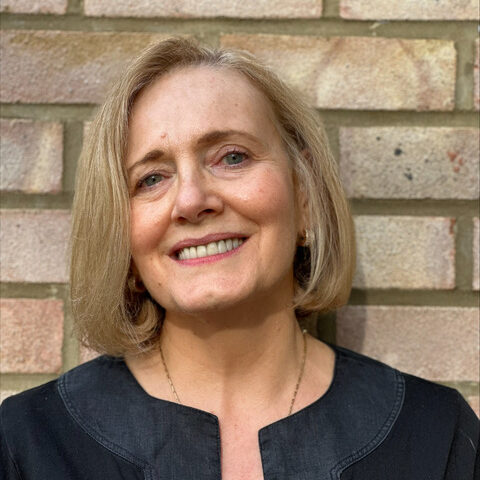
Sharon Memis, Secretary General and CEO, IFLA
Sharon Memis, FRSA, took up the role of Secretary General and CEO of the International Federation of Library Associations and Institutions (IFLA) in June 2023. Sharon’s background is in international cultural relations and higher education. She is a passionate internationalist and speaks several languages. Sharon spent most of her career with the British Council and held senior leadership roles in Europe, North America and Asia promoting UK Education and Culture. She has also worked for a range of organisations as a consultant in international strategy. Prior to joining IFLA, Sharon was Chief Operating Officer at the Association of Commonwealth Universities.
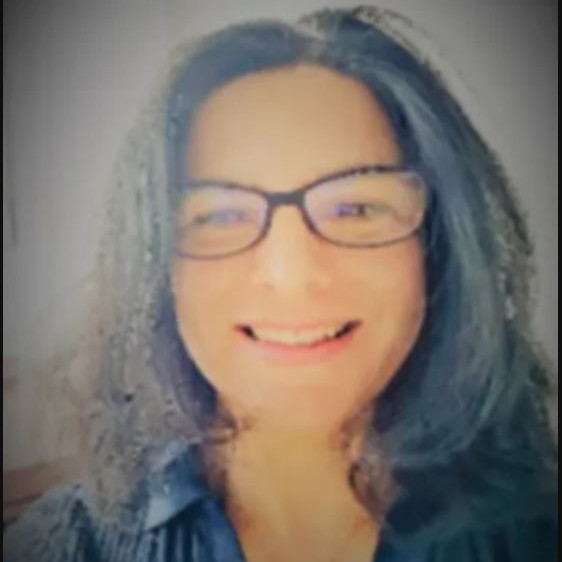
Zeynep Varoglu, Programme Specialist, UNESCO
Zeynep Varoglu is a Programme Specialist in the Digital Innovation and Transformation
Section of the Communications and Information Sector at UNESCO Headquarters in Paris.
Ms. Varoglu is responsible for the implementation of the UNESCO OER Recommendation
and related OER Dynamic Coalition and the UNESCO ICT Competency Framework for
Teachers (ICT CFT) as well as initiatives in open, distance, flexible and online education. Ms
Varoglu was Co-Responsible Officer for the publication ‘Learning for All: Guidelines for the
Inclusion of Learners with Disabilities in Open and Distance Learning’ and the UNESCO
Project Officer for the development of the UNESCO/COL Guidelines for Open Educational
Resources (OER) in Higher Education.
Ms Varoglu holds a Bachelor of Arts (B.A.) from the University of Toronto and a Master of Education (M.Ed) from the Ontario Institute for Studies in Education (O.I.S.E.), University of Toronto
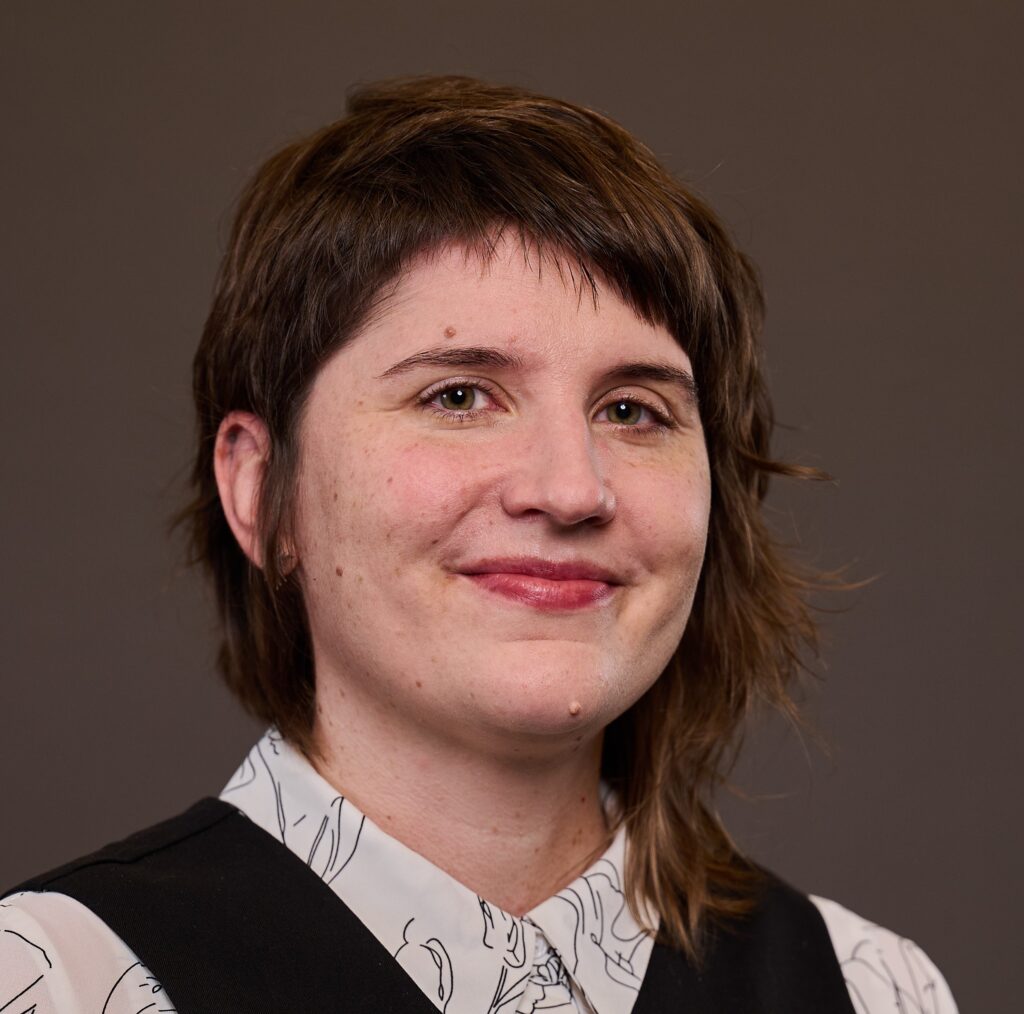
Meg Wacha, Scholarly Communications Officer Coordinator, Outreach & Community Engagement Unit Dag Hammarskjöld Library
Meg Wacha serves as Scholarly Communications Officer and Coordinator of the Library Publishing and Partnerships Unit at the UN Dag Hammarskjöld Library. They are committed to advancing equitable access to information and publishing systems through their dual roles in libraries and the Wikimedia movement. Most recently, they served as the University Scholarly Communications Librarian for the City University of New York, where they led open research initiatives across 25 colleges and 31 libraries. Meg is the recent past president of Wikimedia NYC and has served on advisory boards for LIS Scholarship Archive (LISSA), Wikimedia DC, CUNY Academic Commons (an open-source social networking tool), and International Open Access Week. Meg is also a Visiting Assistant Professor at the Pratt School of Information.
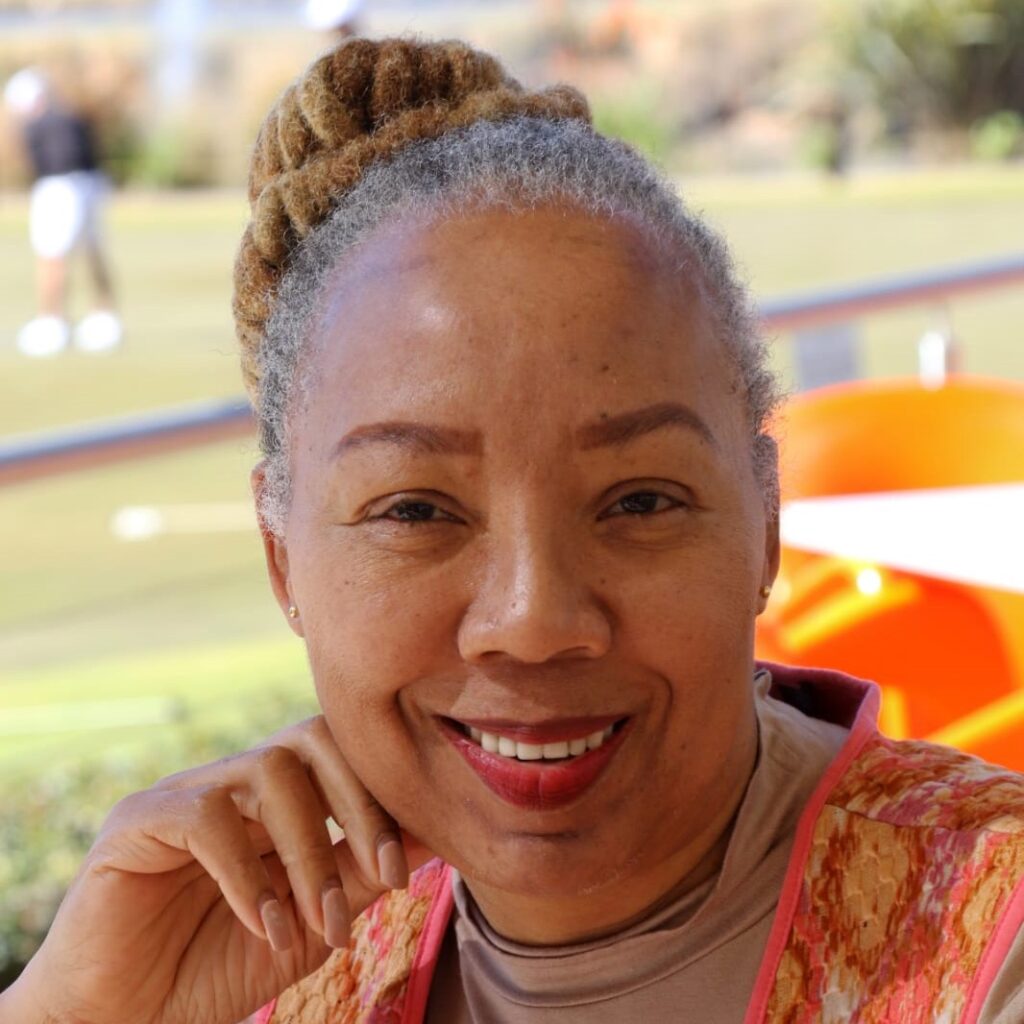
Daisy Selematsela, University Librarian at the University of the Witwatersrand (Wits University)
Daisy Selematsela (PhD) is the University Librarian at the University of the Witwatersrand (Wits University); Previously served as the Executive Director Library & Information Services at the University of South Africa (UNISA) and Acting Vice Principal for Research and Innovation; Executive Director Knowledge Management Corporate at the NRF; An appointed Professor of Practice of Knowledge Management of the University of Johannesburg.
Vice President, 2023-2027 of the International Science Council (ISC); Executive Committee Member of Committee on Data (CODATA) of the International Science Council (ISC).
She served on policy forums such as the UNESCO Science Sector; SA National Commission for UNESCO Forum; Executive member: International Council for Science Union (ICSU SCID) ad Hoc Committee on Information and Data; ICSU EDC Panel – International Science Union World Data Centre Panel.
Her role in academic citizenship involves serving on international Boards of Directors of, CODATA (Committee on Data of the International Science Council) of the International Science Council, Research4Life, GetFTR, Networked Digital Library of Theses & Dissertations (NDLTD) and previously served on the boards of ORCID and COAR (Confederation of Open Access Repositories). At national level serves on the Board of Directors of ITOCA (Information Training and Outreach Centre for Africa), SANLiC (South African National Licensing Consortium) and serves as Chairperson of both CHELSA (Committee for Higher Education Librarians of South Africa) the South African National Committee of CODATA through the NRF. She previously served on the Board of the National Library of South Africa, Council for Library and Information Services (NCLIS) and Council of the National Archives of South Africa.
She served on the Editorial Board of Committee on Data for Science and Technology (CODATA) Data Science Journal (DSJ). Currently on the Editorial Boards of Global Change Research Data Publishing and Repository and Preservation, Digital Technology & Culture (PDT&C) Journal; ALIS (Annals of Library and Information Science) Journal.
Daisy is the recipient of the 2016 and 2019 Knowledge Management Leadership Award by the Global Knowledge Management Congress & Awards in association with World Education Congress; and the 1st International Conference on Knowledge and Innovation Management (ICKIM) Babcock University.
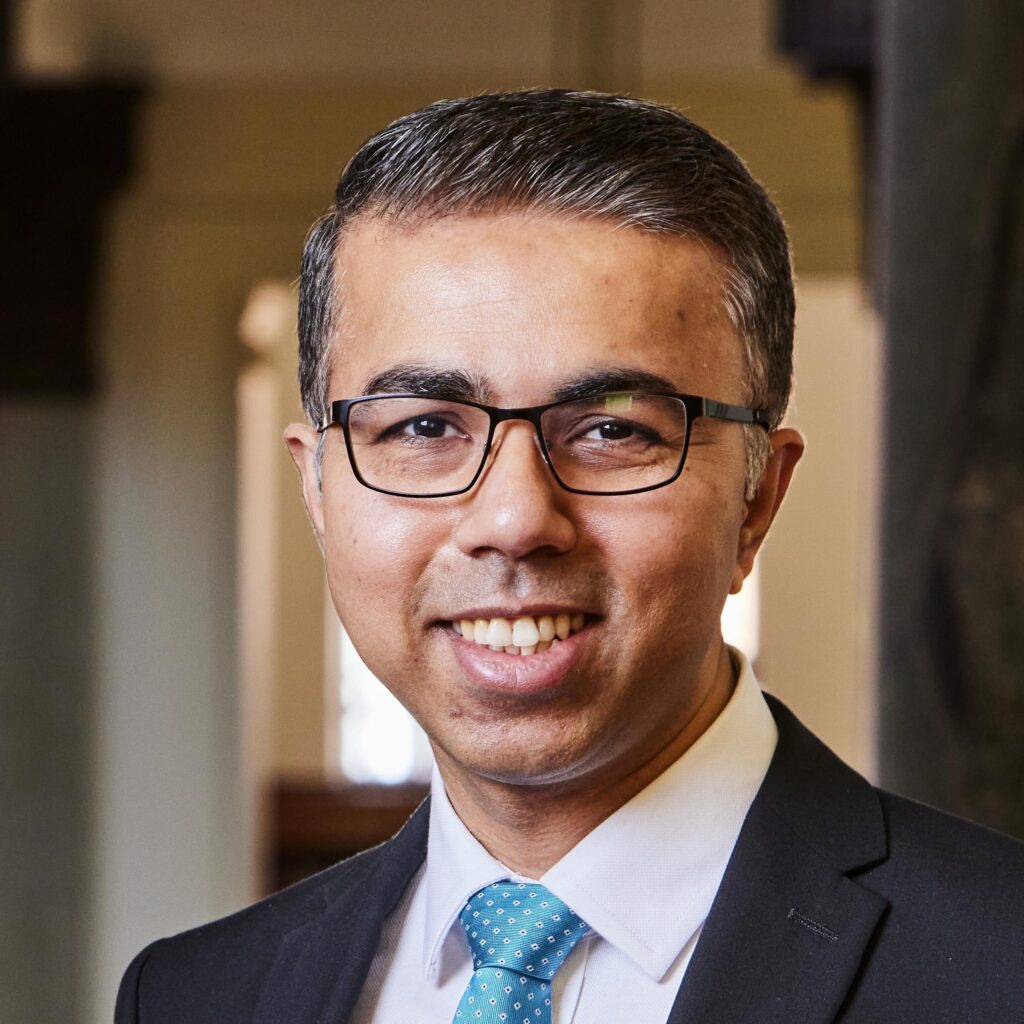
Masud Khokhar, University of Leeds, Knowledge Equity Network
A computer scientist by education, Masud is passionate about digital leadership and innovation in the changing library and archive environments. His core interests cut across the topics of strategic leadership, digital transformation, user experience, learning spaces, innovation cultures, open education and research, and staff talent realisation.
Masud joined the University of Leeds in 2021 and has had a varied career with senior roles in the private sector and higher education, including at the Bodleian Libraries (University of Oxford), Lancaster University, and the University of York. In 2023, Masud also took on the additional responsibility of Director of Learning Spaces to develop the strategic delivery programme for learning spaces at the University of Leeds.
Masud is the current chair of Research Libraries UK (RLUK), a consortium of the 39 leading and most significant research libraries in the UK and Ireland. He also serves on the White Rose Libraries Executive Board, as an external member of the Cambridge University Library Syndicate and provides guidance and support to AHRC on research infrastructures.
Masud is particularly interested in leadership, digital transformation, and diversity in academic and research libraries. He has been a keynote speaker on these topics for several leading national and international conferences some of which include Canadian Association of Research Libraries (2023), UKSG conference (2023), CILIP conference (2023), RLUK (2021), IGeLU conference (2019) and ANZREG conference (2018).
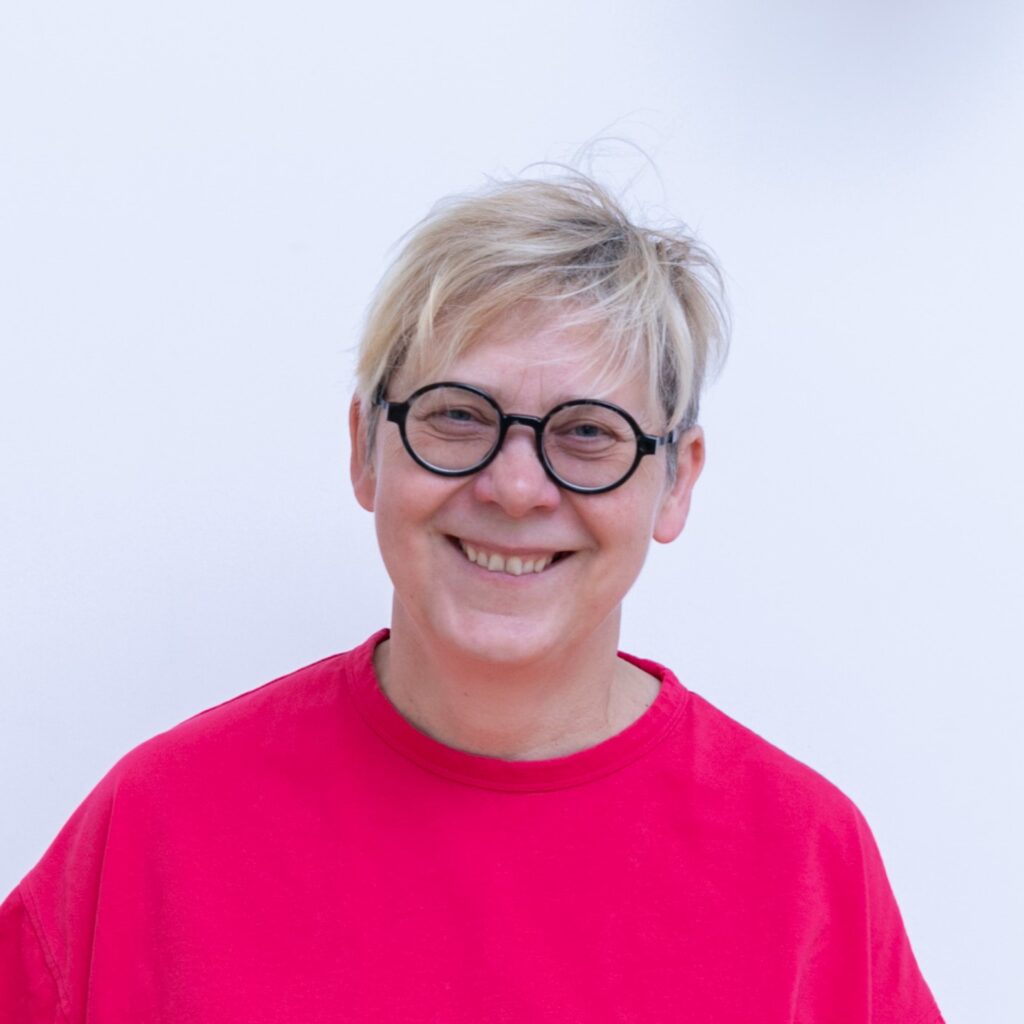
Ramune Petuchovaite, EIFL Public Library Innovation Programme (EIFL-PLIP) Manager for Electronic Information for Libraries (EIFL)
Ramune Petuchovaite is the EIFL Public Library Innovation Programme (EIFL-PLIP) Manager for Electronic Information for Libraries (EIFL). Ramune is responsible for the development, delivery and evaluation of a range of activities that contribute to community development through public libraries in EIFL focus geography – developing and transition economy countries. In addition, Ramune has contributed to buildout of a framework for public librarians’ capacity building for digital inclusion efforts and led the EIFL’s digital capacity building initiatives for public librarians in several partner countries in Africa, such as Ghana, Kenya, Namibia, Uganda, and other.
Before joining EIFL in 2012, Ramune served as Chief Specialist at the Division of Information Society Development of the Ministry of Culture of the Republic of Lithuania, where she was responsible for coordinating implementation of the state-funded library renovation and modernization programme. During her term at the Ministry, Ramune worked on a US$36 million national ‘Libraries for Innovation’ project, co-funded by the Bill and Melinda Gates Foundation, which improved public access to computer and internet services in over 1,300 public libraries. Ramune has also lectured library and information students on library management, project management and other subjects at the Faculty of Communication, Vilnius University, and contributed to librarians’ continuous professional development in Lithuania.
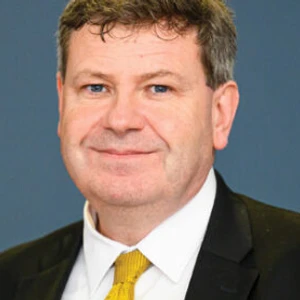
Patrick Paul Walsh, Vice President of Education, UN Sustainable Development Solutions Network (SDSN)
Patrick Paul Walsh is the Vice President of Education and Director of the SDG Academy at the UN Sustainable Development Solutions Network (SDSN). He is is on secondment from University College Dublin where he remains a Full Professor of International Development Studies, Director of the UCD M.Sc. in Sustainable Development in partnership with the SDG Academy and President of the Statistical and Social Inquiry Society (SSISI) of Ireland. He received a Ph.D. in Economics from the London School of Economics and Political Science. He is a Government of Ireland Fellow, Marie Curie (Brussels) Fellow, IZA (Bonn) Fellow, RSA (London) Fellow, EIIR (Brussels) Fellow and REPOA (Tanzania) fellow. He has held academic positions in Trinity College Dublin, K.U. Leuven, Harvard University and Columbia University. He has also held positions in the United Nations, European Commission, IMF and World Bank. His current focus is on Sustainable Development Education than is informed by Science, Practice and Policy.
